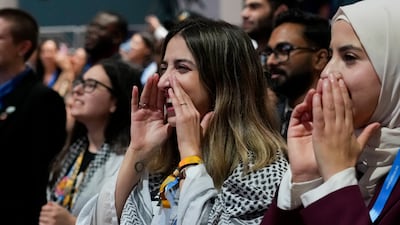A faith leader has asked if those at Cop29 can sleep well at night if they fail to reach a deal that benefits the planet. Rev Henrik Grape, senior adviser on climate to the World Council of Churches, said parties needed to evaluate the deadlocked discussions in Azerbaijan from a moral perspective.
Speaking on Thursday as time started to run out for a deal on new funding targets from rich to poor, Rev Grape urged those negotiating to lift their eyes to the horizon as "much more finance than is on the table” would ultimately be needed.
“They also need to … evaluate from a moral side,” Rev Grape told The National.
“Can you … sleep good at night, taking this decision ... not acting on climate change enough," he said.
"We will have so much of a problem in the future, especially for the most vulnerable.
“Some may pray for a miracle. I would say pray and act."

Rev Grape, who is based in Sweden, spoke on the penultimate day of the climate talks as the “interfaith statement for climate action at Cop29” was highlighted at a briefing.
The call, from the interfaith liaison committee to the United Nations Framework Convention on Climate Change, has been endorsed by more than 60 faith organisations across the globe.
“At Cop29, world leaders must act with moral clarity and ambition, moving beyond delays to reset our course towards a just, sustainable future,” the statement reads.
“This pivotal moment requires us to safeguard our planet for generations to come, honouring our shared responsibility to all forms of life.”
But Rev Grape said he did not think that all parties considered summits from this noble perspective.
“They are so much into the bubble of economies,” he said. “Is it profitable or not; what's in it for me?”
Rev Grape said Cops are becoming more like business events and this puts a certain "narrative to the decision maker”.
“The more industry you have and businesses you have in the delegations and the less movement of civil society you have, you lose those voices,” he said.
“And I would say that faith is one of those voices. Faith represents for me also a kind of value-based understanding about what it is to be human.
“Every religion has the kind of caring for each other, caring for creation, caring for the most vulnerable, and the economics that we have today are not so much caring, even if they say so.”
The UNFCCC faith committee has been in operation for 10 years and encompasses the world’s major religions from Islam to Christianity. The World Council of Churches, for example, was founded in 1948 and says it represents more than 580 million Christians worldwide.

Iyad Abu Moghli, founder and director of the United Nations Environment Programme “faith for Earth initiative” was also among the speakers at the briefing. He said faith organisations feel there is a “missing component” in the climate conversation which is “moral responsibility” and “the ethical approach of policies”.
“Many of the [faith] organisations believe that at the heart of it, is the unsustainable consumption and unsustainable production," he said.
“This is why the faith organisations are coming together to propose not an alternative but an additional and complementing mechanism to support negotiators and support nations.”
Faith pavilions and pre-summit gatherings of religious leaders have been a part of the past few Cops as a way to encourage negotiators to see a fuller picture of climate change and its consequences.
Last year in Dubai, 28 faith leaders also signed the "Abu Dhabi interfaith statement for Cop28", which expressed their “shared concern” over climate change, as well as a joint commitment to address the crisis.


